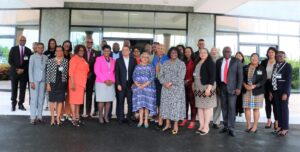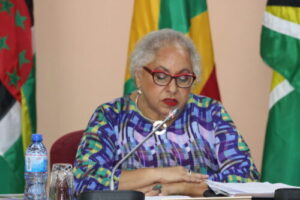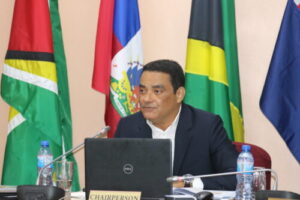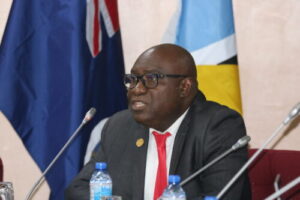
Ministers of Education in CARICOM were today, 13 October, urged to devise comprehensive recommendations for quality education and to clearly articulate the immediate actions necessary to change how schools re-engage with learners and communities.
At the opening of the 44th Meeting of the Council for Human and Social Development (COHSOD-Education), CARICOM Assistant Secretary-General, Alison Drayton told the Ministers gathered at the Georgetown, Guyana Headquarters of the CARICOM Secretariat that she is heartened by their commitment to identifying solutions to respond to the setbacks on education from the COVID-19 pandemic.
She expressed optimism that strong and tangible outcomes would emanate from the two-day meeting to strengthen regional strategies to build resilience in the sector.
The Ministers are examining a range of issues including strategies for monitoring the implementation of the CARICOM Human Resource Development (C-HRD) 2030 Strategy, learning recovery and learning acceleration after COVID-19 and recommendations for designing a world-class education system in the Caribbean through a new Caribbean School Model. They are also considering matters related to the Basic Education Quality Management Framework, CARICOM Standards for the Teaching Profession, Technical and Vocational Education (TVET), and the CARICOM Vocational Qualifications (CQVs).
“In our commitment to act collectively, resilience and agility in education delivery, the theme that guides the thinking for our meeting, requires that we make fundamental paradigm shifts in how we speak of the purpose of education for human capital development, in how we look to resource education and how we re-prioritise strategies within the C-HRD 2030 Strategy for accelerated implementation”, ASG Drayton told the Ministers.
Emphasizing the need for education reform to become the Region’s recovery, adaptation, and resilience strategy,” she referenced research that found that students in grades 1-12 affected by school closures will earn 3% lower income over their lifetime, globally. Conversely, every additional year that a child stays in school, they have the potential to earn a 10% increase in income, Ms. Drayton added.
“Let’s do the Math! Our attention needs to be on strengthening the internal efficiencies of our education systems to enhance completion and survival rates, and learning outcomes, for all learners despite, gender, socio-economic class, race, or geography.”
Speaking on advocacy for greater efforts for achieving the goals of the C-HRD 2030 Strategy, and the United Nations Sustainable Development Goal 4 for quality learning and lifelong education, ASG Drayton said,
“We are one-fifth of the way into the decade for action and eight years away from 2030, yet we know that we are a long way away from the development targets that we have set for ourselves regionally.”
In this context, she noted the importance of changing the ways the Region monitors, quality assures, governs, and finances Early Childhood Education, teacher recruitment, preparation, leadership development, as well as curriculum diversification reform for skills development.
Chair of the Meeting, Hon. Francis Fonseca, Minister of Education, Culture, Science, and Technology of Belize called on his colleagues to articulate the practical means through which regional, systemic, and local actions can be refocused to ensure that gaps in learning created by school closures will be addressed, and in the process, mitigate against reductions in national productivity and individual earning power over the next three to five years.
Guyana’s Chief Education Officer Dr. Marcel Hutson, in his remarks on behalf of his Minister, underscored the importance of COHSOD as pivotal to the transformation of the education sector in the Region.
As the Community addresses education access, quality, equity, inclusivity, and lifelong learning, he said evidence-based instruction, linking school and home, personalised learning, professional development, and improving governance and accountability of the education system must be brought sharply into focus.
“As we move forward, we must do so with the greatest degree of alacrity and commitment to serve our young people, who are the foundation of a bright and prosperous Caribbean,” Dr Hutson said as he urged the Ministers to take “no shortcuts to the road to success.”




The present curricula in public learning institutions are geared toward rote learning. Creativity, imaginativeness, inventiveness and originality stifled.
There is too much emphasis on competition, tests and scores. Because we focus on the academic aspect of learning so exclusively, the holistic development of the child gets neglected. The innate talents of the students are untapped.
After graduating from any level of our education system ( primary, secondary, tertiary) the student should be well rounded.
Education should also be exciting. It is too monotonous most of the time. A lesson well planned but boring is like a blacksmith hammering on cold iron. We have to engage in ongoing training of our teachers. Schools should be well resourced.
I do hope what they hatched out isn’t half as Eurocentric as current curricula in those former European colonies when we were owned. Look to Ghana 🇬🇭 they got rid of the education models Britain installed to pacify them in order to keep their resources ‘for their own good’.
In terms of re-engaging with learners and communities, these words of Dr. Nicole Le Pera are worth considering.
Society pushes us from childhood to be in a chronic state of flight or fright. Rush to school. Compete for good grades. Compete in sports. Achieve. Perform.
Our nervous system needs: stillness, quiet, play and creativity.
We’re human, not machines.
.